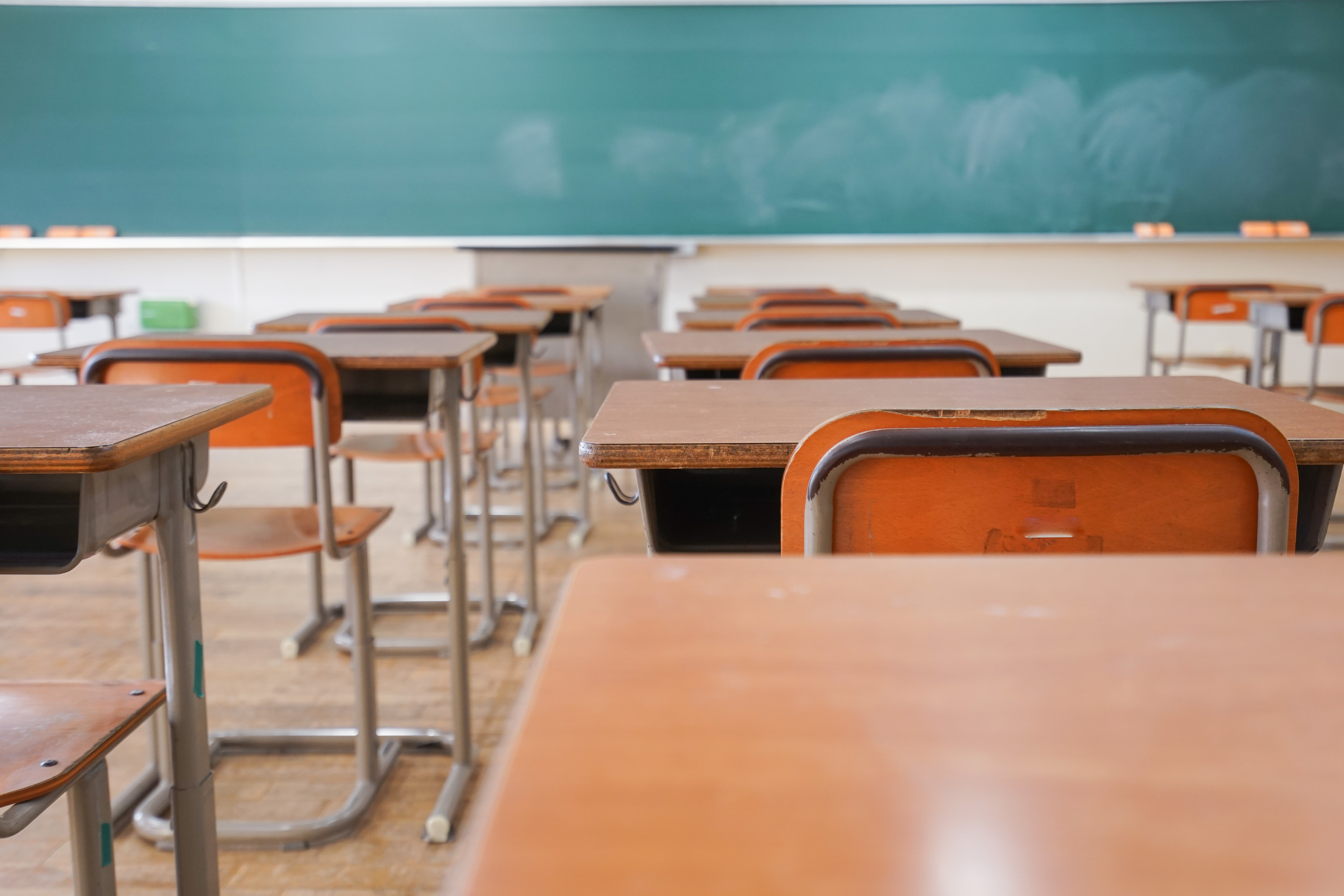Should teachers be apolitical?
When educators of young children shy away from politics, are they doing more harm than good?


A free daily email with the biggest news stories of the day – and the best features from TheWeek.com
You are now subscribed
Your newsletter sign-up was successful
A few years ago, a first-grader asked me if I'd heard about what President Trump said on TV the night before. I hesitated. I was right in the middle of a lesson that had nothing to do with politics — it was math — but the bigger issue was how deeply to engage.
"No," I finally said. "What did he say?"
The student took a deep breath, looked around at his peers, and said: "Trump got on the TV and said he was going to get on a plane to come here, then when he got off he was going to shoot all the black and brown kids he could find until they were dead."
The Week
Escape your echo chamber. Get the facts behind the news, plus analysis from multiple perspectives.

Sign up for The Week's Free Newsletters
From our morning news briefing to a weekly Good News Newsletter, get the best of The Week delivered directly to your inbox.
From our morning news briefing to a weekly Good News Newsletter, get the best of The Week delivered directly to your inbox.
I was stunned. By then, I was accustomed to Trump's provocative statements — and I'll admit to entertaining the fleeting thought — Wait … DID he say that? — before eventually coming to the understanding that the student had taken bits and pieces from all over the place and combined them into one truly alarming statement.
He was misinformed, but he was also scared — being a young boy of color, surrounded by stories of mass shootings, deportations, children being separated from their families, and so much more, he'd cobbled together a fear of his president personally coming to kill him. He was visibly nervous, worried enough that he took some deep breaths as I tried to gather myself to give a measured, reassuring response.
It's a tricky time to be a teacher in the United States. A convergence of hyper-visible events — gun violence, elections, impeachment, rumblings about war — and ever-present media makes it so that students, even our very youngest, walk into the classroom with a lot of information and even more questions, along with strong emotions.
Sometimes the information is inaccurate. And as much as teachers need to let students construct their own knowledge, and as much as we strive to be moderators and facilitators of learning — rather than being authoritarian — there are times when we have to be clear and unequivocal about facts. As a country we are grappling with serious issues of honesty, authenticity, apology, and the very fabric of truth, and kids need it all modeled consistently and decisively.
A free daily email with the biggest news stories of the day – and the best features from TheWeek.com
So I told the student that no, Trump hadn't said that, and he wasn't in any danger. He seemed to understand. But I'd only removed an immediate fear; what still remained was a deeper worry about his safety in the world.
It's become clearer than ever that the realm of politics intersects with daily life in real, tangible, immediate ways. As much as politicians sometimes seem like distant players of a game that has no real consequences for daily life, the clichés endure for a reason: Politics is life, and everything is political. And here's the main crux of the issue, for teachers: Politics affect some of us far more than others.
My life experience, as a white male teacher, will never compare to what some of my students will live. They will face prejudice, discrimination, and systemic exclusion in ways I never have and never will. They don't have the luxury of avoiding topics of racism, police brutality, Islamophobia, sexism, gun violence, and the other barriers that are still insidious realities of our society. So as a trusted adult figure in kids' lives, when I come across as apolitical, it recalls Bishop Desmond Tutu's famous quote: "If you are neutral in situations of injustice, you have chosen the side of the oppressor. If an elephant has its foot on the tail of a mouse, and you say that you are neutral, the mouse will not appreciate your neutrality."
So, what do teachers do when politics and classroom life collide? When students are being harmed by the words of politicians? When the actions of our leaders stand in direct contrast to our classroom, school, and broader community values? There are a number of ways for teachers to responsibly entertain debates about politics, but we have to protect our most vulnerable — the ones who stand to lose the most if we invoke "both sides" and move along with our day.
When teachers have robust classroom rules and agreements, and when a school or district's mission statement is thoughtful and authentic, teachers have a reference point for the tough moments. If a student comes in sharing a story of a police shooting with classmates, but has little to no frame of reference for how to talk about it, you can point to your rules — a shared charter — as a starting point. When this came up, as it often did, I'd ask: "Does violence match with how we've agreed to treat one another in this class? With how we've agreed to try to solve our problems?"
Kids have an easy time saying that no, it doesn't. I'd follow up with other discussion points including, "What about what we've agreed to do when people need help?" and kids, always astute, can explain in detail that we have an obligation to help anyone who's hurt, whether in their body or their thoughts and feelings. This particular conversation might continue around what kids think of guns and how guns make them feel; it always ended with reassurances that their fears are real and valid, that it's not fair they have to feel this way, that some people are less afraid and that's also not fair, and that adults in their lives will protect them as much as they can.
These are hard conversations to have with young kids, but by brushing them aside, we inadvertently teach kids that talking about fear is taboo. That the hard things we hear about in the news are not to be discussed, that they are secret and only for grownups, and that we can't talk about them. This only makes kids more curious, and unfortunately, less prepared — and less emotionally safe.
Any time political topics like this come up — and gun violence is always political, as is immigration, war, and what the president tweeted — each teacher has a choice about how to handle it. But staying neutral, or sweeping it under the rug, is a cop out. Kids, especially young ones, often love their teachers so much, they'll side with them on anything, so educators need to be careful — you don't need to tell kids who you voted for, or what political party you belong to. But when you see injustices, unkind words, and threats to the safety of your students, just saying "everyone can believe what they want" actually does more harm than good.
As James Baldwin said: "We can disagree and still love each other unless your disagreement is rooted in my oppression and denial of my humanity and right to exist."
Disagreement is only valid when everyone is safe. Until then, teachers need to protect vulnerable students — and in doing that, we will sometimes take political stances in the classroom.
Want more essential commentary and analysis like this delivered straight to your inbox? Sign up for The Week's "Today's best articles" newsletter here.
Bret Turner is a first-grade teacher, father, and children's musician. He is a contributor to PBS Kids and Teaching Tolerance, he's a sourdough bread baker, and has a three-legged dog. You can find more of his writing here.
-
 Why are election experts taking Trump’s midterm threats seriously?
Why are election experts taking Trump’s midterm threats seriously?IN THE SPOTLIGHT As the president muses about polling place deployments and a centralized electoral system aimed at one-party control, lawmakers are taking this administration at its word
-
 ‘Restaurateurs have become millionaires’
‘Restaurateurs have become millionaires’Instant Opinion Opinion, comment and editorials of the day
-
 Earth is rapidly approaching a ‘hothouse’ trajectory of warming
Earth is rapidly approaching a ‘hothouse’ trajectory of warmingThe explainer It may become impossible to fix
-
 The billionaires’ wealth tax: a catastrophe for California?
The billionaires’ wealth tax: a catastrophe for California?Talking Point Peter Thiel and Larry Page preparing to change state residency
-
 Bari Weiss’ ‘60 Minutes’ scandal is about more than one report
Bari Weiss’ ‘60 Minutes’ scandal is about more than one reportIN THE SPOTLIGHT By blocking an approved segment on a controversial prison holding US deportees in El Salvador, the editor-in-chief of CBS News has become the main story
-
 Has Zohran Mamdani shown the Democrats how to win again?
Has Zohran Mamdani shown the Democrats how to win again?Today’s Big Question New York City mayoral election touted as victory for left-wing populists but moderate centrist wins elsewhere present more complex path for Democratic Party
-
 Millions turn out for anti-Trump ‘No Kings’ rallies
Millions turn out for anti-Trump ‘No Kings’ ralliesSpeed Read An estimated 7 million people participated, 2 million more than at the first ‘No Kings’ protest in June
-
 Ghislaine Maxwell: angling for a Trump pardon
Ghislaine Maxwell: angling for a Trump pardonTalking Point Convicted sex trafficker's testimony could shed new light on president's links to Jeffrey Epstein
-
 The last words and final moments of 40 presidents
The last words and final moments of 40 presidentsThe Explainer Some are eloquent quotes worthy of the holders of the highest office in the nation, and others... aren't
-
 The JFK files: the truth at last?
The JFK files: the truth at last?In The Spotlight More than 64,000 previously classified documents relating the 1963 assassination of John F. Kennedy have been released by the Trump administration
-
 'Seriously, not literally': how should the world take Donald Trump?
'Seriously, not literally': how should the world take Donald Trump?Today's big question White House rhetoric and reality look likely to become increasingly blurred
